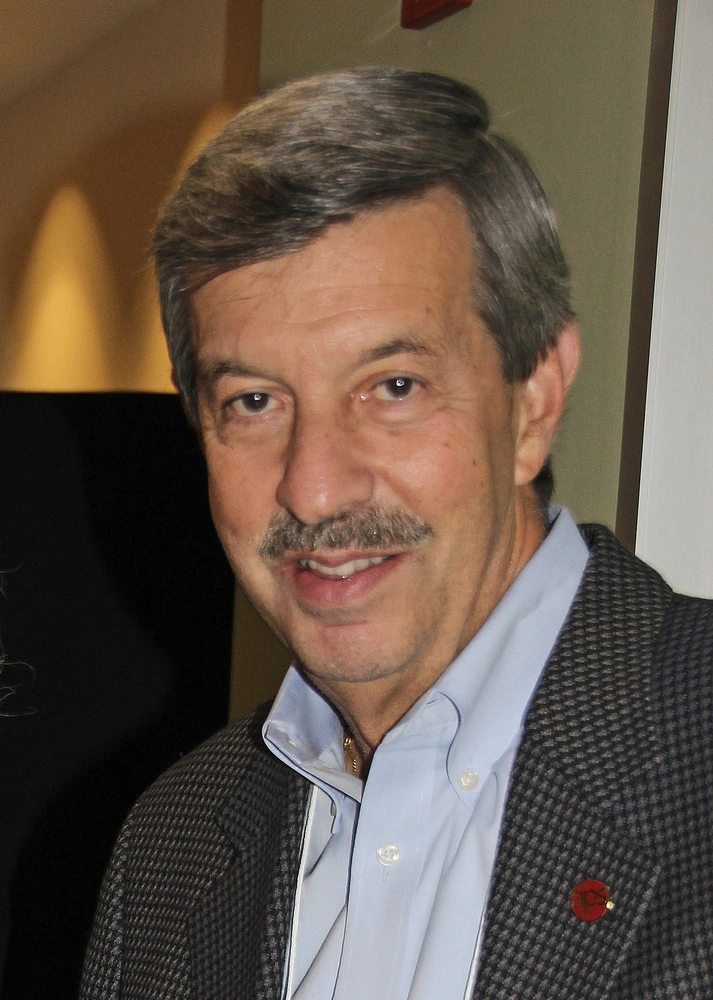
From his early days as an undergraduate, watching in amazement as Illinois professor F. R. Steggerda demonstrated the inner workings of the heart and blood vessels in a dog, Martin Frank wanted to make his own mark in science.
Frank has certainly accomplished that goal, though the road he took wasn’t the one he imagined. From those early days in Steggerda’s class, Frank imagined himself as a professor in a Midwest town, riding a bicycle onto campus with a brown bag lunch in his hand. He would spend his time in the lab and classroom, and sometimes under the cool shade of a tree discussing science with his students. It was a lofty goal for a young man from Chicago who got to Illinois through a scholarship program through the Western Golf Association after realizing his family didn’t have the means to pay for his education.
Taking advantage of his opportunities, Frank immersed himself in physiology, earning all his degrees, through his doctorate in 1973, at Illinois. He took positions as a teaching assistant, research assistant, pre-doctoral research trainee and went on to take postdoctoral positions at the Michigan Cancer Foundation and Michigan State University.
As an assistant professor at George Washington University, the perfect picture in Frank’s mind started to fade. He couldn’t afford a home close enough to campus to bike. And there were no musings under the tree.
About that time, Frank came to realize that for all the science he’d learned in all those labs, he had gotten another education. Through grant applications, directing research programs and advising graduate students, Frank had become an excellent administrator.
And instead of those bike rides into campus, Frank was driving in and listening to National Public Radio, which regularly carried stories about science policy and funding in Washington, D.C.
“It’s very easy to get enamored with what goes on at Capitol Hill, what goes on in the White House and how that all affects science policy,” Frank said.
Frank was enamored, and he applied for a program through the National Institutes for Health that trained bench scientists in research administration for a year. Instead of that program, however, NIH approached Frank to become executive secretary of the physiology section of the Division of Research Grants, where he spent seven years managing peer evaluation of hundreds of funding proposals.
During his last two years in government, Frank was also a member of the Department of Health and Human Services Senior Executive Service Candidate Development Program. As part of the program, he worked in the Office of Program Planning and Evaluation, Office of the Assistant Secretary of Health, working on Orphan Drug legislation. In 1985, he became the executive director of the American Physiological Society, a position he has held ever since.
“I saw another path — a path that I thought would let me do more for my discipline. I came to realize that I could do more for physiology research in administration than I could do in the lab,” Frank said.
Over the last three decades, Frank has put particular emphasis on access to science through the APS.
The Porter Physiology Program, started in the 1960s to support minority scientists, has been greatly expanded. There is now a travel program that helps scientists attend the APS annual meeting and the program supports up to a half dozen pre-doctoral fellowships per year.
The APS brings middle and high school teachers into labs during the summer and supports an undergraduate summer research program.
In the 1990s, the APS started publishing its scientific journals online and providing content free to the public one year after publication.
“We’ve carried a commitment to minority education and support of minorities to many of our programs, and we have championed the idea of expanding the reach of science by providing access to our publications and being active in classrooms,” Frank said. “When you really think about society and the world around us, we are surrounded by science. We need to get as many people knowledgeable about science and get them passing that enthusiasm forward.”
While Frank didn’t make the type of mark he set out to make in his years at school, he found that his Illinois education put him in a position to succeed in ways he never imagined.
“It gave me the skills — critical thinking, problem solving — which I think are critical to an individual’s ability to do anything today,” Frank said. “While I may not have envisioned myself becoming executive director of APS, I realized that I was never going to win a Nobel Prize. What I’ve tried to do is use those skills to create an environment where maybe someone else can win a Nobel Prize.”
Frank continues to visit the Department of Molecular and Integrative Physiology and to lend his support and expertise. “The Department of Molecular and Integrative Physiology is a small, but strong department, that is central to the research and educational missions of the School of MCB and the College of LAS. As it continues to grow, it should continue to be viewed as a top physiology department within the US and internationally.”